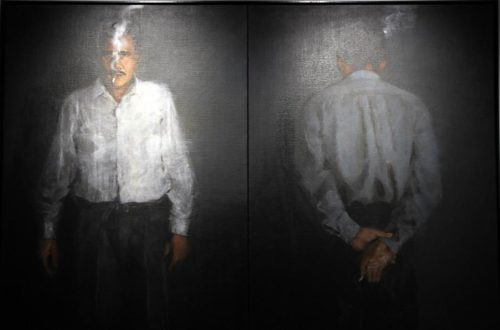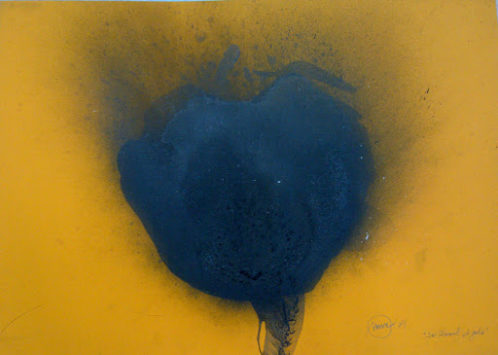
Masashi Wakui, photography. (Tokyo, 2018)
“With the majority of mankind the mind is entirely under the control of the body; the mind is very little developed. The vast mass of humanity, if you will kindly excuse me, is very little removed from the animals. Not only that, but, in many instances, the power of control is very little higher than that of the lower animals. We have very little command of our minds. ”
Vivekananda (Raji Yoga)
“Dissociation is at its essence about both forgetting and remembering. It has the feeling of: “I can’t remember and I can’t not remember.”
Margaret L. Hainer (The Ferenzi Paradox, from The Dissociative Mind in Psychoanalysis: Understanding and Working With Trauma.)
“The parallel between ideology and schizophrenia, established by Gabel (La Fausse Conscience) must be placed in this economic process of materialization of ideology. Society has become what ideology already was. The removal of praxis and the anti-dialectical false consciousness which accompanies it are imposed during every hour of daily life subjected to the spectacle; this must be understood as a systematic organization of the “failure of the faculty of encounter” and as its replacement by a hallucinatory social fact: the false consciousness of encounter, the “illusion of encounter.” In a society where no one can any longer be recognized by others, every individual becomes unable to recognize his own reality. Ideology is at home; separation has built its world.”
Guy Debord (Society of the Spectacle)
“My mind’s got a mind of its own.”
Alan Ginsburg (in conversation)
“Every theatrical work of art, is an enigma, but an enigma expressed in speech: articulated, spoken and heard without any alien medium filling in its gaps. That is why the art of the theatre is the art of the “malentendu”, the misheard and the misunderstood.”
Andre Green (The Tragic Effect; The Oedipus Complex in Tragedy)
Recently a high school teacher in Scandinavia was arrested for sexting (sic) female students. When he was caught he said “but that wasn’t me, that’s not me. I don’t recognize that person, the person who did that.” One can find dozens of such examples. The confession is the confession of someone else. And this is a real feeling, no doubt. I feel that increasingly in contemporary society there is a sense of unreality, that one is not actually part of this debacle, that the *real* me is other, outside, or not yet emerged somehow.

Giovanni Gasparro

Helene Aylon
The recovered memories debacle of the 1990s (most particularly the McMartin Pre School trial) that featured iatrogenic memories of abuse, sexual or otherwise, was largely driven by a kind of moralizing voice, one deeply repressed itself, sexually frustrated probably, and enraged. I remember, as a side bar incident, in my early misspent youth, a public defender I once had. A great woman who later became a judge in LA County. Anyway, the police testified against me and exaggerated wildly. I told her, this never happened. She said I know, I already know that. These cops lie when they don’t have to, they lie compulsively and its always exaggerated and hence rather self evident. She said it seems to be something in the psyche of those who become cops. Now I relate this anecdote because during this entire Covid debacle the most zealous stigmatizers and shamers in media AND on the streets have been those same voices. These are always the people who claim to care for your health, or care for your child’s well being, and who resemble the classic snitch, as well. There is a reason snitches get tossed from the top tier in D block. I have to share another side bar. I was living with a women who was a court reporter and was who was assigned the McMartin case, the first day of discovery or something. I forget. But I do remember her returning that evening deeply shaken. I asked what was wrong and she said, this is a catastrophe. None of these people being accused of this horrible stuff are guilty. She said it’s a fiasco, a travesty. She was shaking. She said I don’t want to cover this case. People will be sentenced to decades in prison and lives destroyed and its all bullshit.
“In clinical charts of schizophrenia,” says Gabel, “the decay of the dialectic of totality (with dissociation as its extreme form) and the decay of the dialectic of becoming (with catatonia as its extreme form) seem solidly united.” The spectator’s consciousness, imprisoned in a flattened universe, bound by the screen of the spectacle behind which his life has been deported, knows only the fictional speakers who unilaterally surround him with their commodities and the politics of their commodities. The spectacle, in its entirety, is his “mirror image.” Here the stage is set with the false exit of generalized autism.”
Guy Debord (Society of the Spectacle)
Debord wrote this almost a half century ago, now. Which is remarkable. And the advance and proliferation of screens, their proliferation and intrusion into nearly all facets of daily life, has, I believe, added additional aspects to Debord’s remarks.

Ahmad Zakii Anwar
There is a dissociative quality to this daily life, now. I find it constantly in the most mundane of activities. There also resonates qualities of guilt and of fear. There is of course always a narcissism that seems to layer nearly everything. But that narcissistic aspect is eroding. The inability to decide things, to discriminate and choose, and there is an increasing normalization, actually, of dissociative states. One might even extend this to gender confusion. The trans-gender topic is beyond the scope here, and there is little question, on one level, of people born with innate and acute identification with a gender that they were not born with (or were intersex, or not). I grew up with a girl, later to become man, and did always sort of sense something was different about *her*. But the idea of gender as manufactured and not critically important is then represented as critically important when you are born with the *wrong* genitalia. In any event the idea of true or false is of less and less importance, it seems. It’s not relativism, its simply not a topic. And as Debord added a paragraph later…“The spectacle obliterates the boundaries between self and world by crushing the self besieged by the presence-absence of the world and it obliterates the boundaries between true and false by driving all lived truth below the real presence of fraud ensured by the organization of appearance. One who passively accepts his alien daily fate is thus pushed toward a madness that reacts in an illusory way to this fate by resorting to magical techniques.”
And the contemporary magic is technology. Even critics of technology are in thrall and besotted with the aura of AI. I have to say I am ever less a believer in any of it. But it preoccupies the masses. Debord was writing from with the consumer culture. Today we are in a transitional state that is post consumerist. The organization of appearance, the representation of the world, is sort of retro-fitted with AI accoutrements. The fear of techno fascism is always partly a love of techno fascism. The tech version of fascism is mediated, largely, with Hollywood narrative, plagiarized shamelessly, but all the better, really. There will always be an encouragement to dissociative experiences when the populace subject identify as audience. Everything is a movie. Elon Musk is a movie star. The left, those intoxicated with cinematic expression of anxiety, are then comforted by its inevitability — as the sales pitch goes. Everything additionally feels like a trailer. Authoritarianism — the surprise hit of the summer!

Hossein Zenderoudi
The audience to myself is one aspect of the dissociative state.
“Traumatogenesis being known; the doubt, whether reality or fantasy, remains or can return (even though everything points at reality). Fantasy theory = an escape of realization (amongst resisting analysts too). They rather accept their … mind (memory) as unreliable than believe that such things with those kind of persons can really have happened. (Self-sacrifice of one’s own mind’s integrity in order to save the parents!).”
Sandor Ferenczi (Notes and Fragments)
“Like the analyst, the painter must permit an interactive process to take place through which the painter’s understanding of what he or she wants to create and how it is to be created, changes as it is expressed on canvas. In this sense, each painting is created as a new act of learning regardless of what was learned in the formal training process of becoming a painter. Each painting must be allowed to possess a changing identity of its own as it is being painted, and this identity must be free to instruct and inform the painter as to how it is to be painted in an evolving rather than a preconceived way.”
Phillp M. Bromberg (Standing in the Spaces)
Both these quotes seem highly relevant to me. Bromberg’s in relation, more, to the limits of instrumental thinking and technology itself, or at least to AI. And Ferenczi’s to the qualities of bad faith inherent in dissociative mental states.

Bohnchang Koo, photography.
I want to touch on Ferenczi again, briefly, because his late work is, I think, hugely important and because Ernest Jones wrote him out of the historical record for psychoanalysis. As Margaret Hainer notes…“Ferenczi was from the beginning a “dissident analyst.” Before Ferenczi had met Freud, he primarily worked with the poor, prostitutes, homosexuals, transvestites, and the “unanalyzable.” As early as 1902, he said that homosexuality was not a disease, but a “psychic disposition.” By the 1920s he was overtly characterized as “the enfant terrible of psychoanalysis.”
He was acutely aware of the ubiquity of trauma. Both external and subjective. This is a theme Bromberg writes about nearly a hundred years later.

Sandor Ferenczi
“Breuer and Freud stated, “The basis and the sine qua non of hysteria is the existence of hypnoid states”. These “hypnoid states” have in commonwith hypnosis an intense ideation that is cut off from association with the rest of consciousness. They comprise a “more or less highly organized rudiment of a second consciousness, a condition seconde.”
Elizabeth Howell (The Dissociative Mind in Psychoanalysis; Understanding and Working with Trauma)
The influence of the denial of dissociation is one of repudiating actual experience. This was part of the problem when psychoanalysis migrated to North America. Not only was it radically depoliticised but the privileging of fantasy and a distortion of drives contributed to a de facto goal of adjustment.The analyst wanted to keep things from getting messy.

John Currin
But I want to discuss this moralizing voice, and where it comes from. And, as well, the necessary splitting of mind in contemporary society. Or perhaps I should say splitting of identity.
“The passage from shame to guilt is a road leading from the idea of impurity and pollution to consciousness of a moral wrong. In short, shame is a fact where human responsibility barely plays a part: it is a lot of the gods, striking the man liable to pride or hubris, whereas guilt is the consequence of a fault; it carries the sense of a transgression. The first corresponds to the talion ethic, the second to the ethics of a more understanding justice.”
Andre Green (On Private Madness)
Green is discussing (per Dodds classic The Greeks and the Irrational) the societies of shame and the societies of guilt.
Let me add here another aspect of what I am finding in contemporary society – this quality of non person. The transitioning into non personhood. But there is a colonial history attached to this, too.
“This article uses French novelist and playwright Marie NDiaye, born in Pithiviers in 1967, to theorize a very particular kind of postcolonial inhumanness specific to certain *hybrid’ subjects’. NDiaye’s work revolves obsessively around the psychic, and often fantastically physical disintegration of characters (coded as a racialized minority) who fail to internalize a sufficiently *alive’ imago of their mother (coded as white) The NDiayean protagonist’s sense of herself as a living human being becomes damaged to the point of irreparability, as she drifts between states of blankness, immobility and affective spectralization’. ( ) NDiaye’s scenarios show how a certain kind of postcolonial hybrid is doubly *orphaned’, not in concrete, provable or representable terms, but via the emotional deadness of her *blank’ mother and the unspoken refusal of her only motherland to recognize her as one of its human children.”
Andrew Asibong ( Marie NDiaye, the Half-self and the White ‘Dead’ Mother)

Constantin Schlachter, photography.,
This is suggestive of a generalized and partly diluted traumatized memory, a mild dissociative affect across the culture. There is a society today, or western society today, which is the society of the half self. Societies of shame to societies of guilt, to societies of dissociation and autism. There is, in a sense, a dead Mother for everyone. The origin or foundation myths for all nations (nearly all) amounts always (in the 21st century) to a dead white mother.
“These last remarks lead us to consider a second aspect of moral narcissism. We discover it behind the features of a syndrome rarely mentioned but nonetheless very frequent: affective immaturity. Affective immaturity, which we have learned to recognize little by little, is not a benign form of conflict solution; far from it. On the one hand, the term immaturity is well deserved because this is indeed a case of retardation whose consequences are as serious for the affective cathexes of the subject as intellectual retardation is for the cognitive investments. On the other hand, affective immaturity is based upon a substratum of denial of desire and its instinctual base.( ) . Affective immaturity is the appanage of young girls but is found also in young men – with, however, a more serious prognosis. We know its banal aspects: sentimentality, not sensitivity; a horror of human appetites, oral or sexual, a failure in sublimation which would imply their acceptance; the fear of sex, especially of the penis, which conceals a desire (present in both sexes) of an absolute and incommensurable nature; and the attachment to daydreams that are childish, affected, and willingly messianic. One recognizes these people in everyday life because they often put themselves in the position of a scapegoat; this does not bother them, so sure are they of their superiority over common people.”
Andre Green (ibid)

Veronese (Saint Elena, detail. 1580)
The moral narcissist is the voice driving the McMartin pre School trials. It is the voice of those demanding you wear your mask when entering Whole Foods. So we have the dissociative splitting, the moral narcissist, and the half self of post colonial life and probably all of advanced capitalism as well. The moral narcissist is, however, no longer certain it is he or she who is superior. The dilemma of the dissociative autistic. The screen flattening is the affect flattening together. The moral narcissist knows the pleasure of condemnation. In fact Green quoted Freud “even the subject’s destruction of himself cannot take place without libidinal satisfaction”.
“The first reaction to a shock seems to be always a transitory psychosis, i.e. … a psychotic splitting off of a part of the personality. The dissociated part, however, lives on hidden, ceaselessly endeavoring to make itself felt, without finding any outlet except in neurotic symptoms.”
Sandor Ferenczi (The Confusion of Tongues)
In the society of the spectacle there is a constant uninterrupted stream of mild or secondary shocks. All the time. And the real is renounced, and replaced with a carefully shopped for fantasy. Or perhaps more accurately a fantasy is assembled. The components are selected and assembled. Reality then is a bit like an Ikea bed one has to assemble at home.

Marc Yankus, photography (The Dakota, NYC)
The effect of screens, the effect of the various platforms on which, or in which, life is assembled, contribute to the dissociative condition; a condition which itself is a part of the Ikea assembly package. This is normalizing pathology. And the eruptions of confusion (‘that’s not me, I wouldn’t do something like that. I don’t recognize that person, etc) are also factored into, incorporated into the ongoing stream of screen data. In this sense technology has most certainly mediated our alienation, it has contributed hugely to the loss of verbal skills, and it has damaged, generally, memory and most importantly the sense of self. What Debord called presence/absence.
Identity and responsibility are two words at the forefront of contemporary consciousness. Both are emphasized as of paramount importance while simultaneously both are systematically mystified. The loss of purchase on ‘who I am’ also means ‘I’ can’t be responsible for what ‘I’ do. I remember a young woman saying to me once, “I can’t tell when I am sick”. What she meant was, even when feeling awful she never felt sure if she was ‘really’ feeling awful. The idea of certainty is just one aspect of cognitive impairment.
One of the cornerstones of digital technology, of data gathering and compilation, is to enhance predictability. Contemporary westerners rely on predictability a good deal. It is a comfort blanket for adults. Wittgenstein’s late aphorisms (written not long before his death while he traveled between Vienna and Oxford, mostly) are useful in illuminating another aspect of what I am calling this new dissociative condition. And that aspect is language.

Christiane Baumgartner, photography.
“If you are not certain of any fact, you cannot be certain of the meaning of your words either […] If you tried to doubt everything you would not get as far as doubting anything. The game of doubting itself presupposes certainty.”
Wittgenstein (On Certainty)
The dissociative creates something almost uncanny in terms of predictability. But I want to return to Andre Green, for this is probably more to the point here.
“In particular, moral narcissism has a very close relationship with intellectual narcissism. We recall that we understand intellectual narcissism to be that form of self-sufficiency and solitary valorization which makes up for the lack of human desires with intellectual mastery or intellectual seduction. It is not rare for moral narcissism to ally itself with intellectual narcissism and to find in this kind of displacement an addition to pseudo-sublimation.”
Andre Green (ibid)
Green’s ideas on what he terms ‘moral narcissism’ seem important so allow me another quote…
“In the case of moral narcissism, intellectual activity and the exercise of thought are supported by a reconstruction of the world- the establishment of a morality, a truly paranoid activity which constantly remakes and remodels reality according to a pattern in which everything instinctual will be omitted or resolved without conflict. To sum up, the percept-consciousness system, insofar as it is narcissistically cathected, is in a state of ‘surveillance’, tightly controlled and thwarted by the superego, just as in the delusion of observation; it has, however, a different type of economic equilibrium. But it is above all with bodily narcissism, as one might suspect, that moral narcissism has the closest relationship. The body as an appearance and source of pleasure, of seduction and conquest of others, is banished. In the case of the moral narcissist, hell is not other people – narcissism has eliminated them – but rather, the body. “
Andre Green (ibid)

Martin Schnurr
The second quote above seems rather apt given the continuing lockdowns around the world, even where, mostly, there is no virus. People are not dying so the terminology changes. Cases is used to describe positive test results. In the vast majority of cases, the overwhelming majority of cases, there are no symptoms accompanying a positive result. So, the terms change, *cases* suggests sickness, even though there is close to none. The body for the moral narcissist, one with borderline dissociative tendencies, must be wiped out. Muzzled at the very least.
Social distancing to keep the shame of pleasure at bay. Or if not pleasure, then certainly carnality and desire. Now of course the moral narcissist is uneasy with others, with people in general, and often with crowds. It is not, however, particularly conscious of this discomfort. It is more attuned to its own rejection of pleasure, of anything hedonistic. For hedonism is the devil’s playground, the path to purgatory. The is also the voice of depopulation.
“The Freudian subject, by bringing drives under control achieves agency…The battles waged against oneself carry far more weight than indifferent reality.”
Ghislaine Boulanger (Wounded by Reality: Understanding and Treating Adult Onset Trauma)

Winfred Gaul
Green wrote that he hoped, like Freud, that clinical treatment could give the patient a bit more life, that he or she could be a bit more alive ..even if the symptoms didn’t disappear. The sense of deadness permeates Green’s writings. A collection of essays on Green is titled The Dead Mother.
Green said in an interview….“What I think we are doing in analysis is to enable the people who come to us to increase their feeling of freedom. In what way? In order to liberate the forces which are present in themselves to enjoy life, not as scared people looking for all sorts of safety, nor as repenting sinners, but as human beings who are inhibited by something which makes them move on in quest of something they value.”
The current ascension of the dissociative suggests not just a fragmenting sense of self, but that contemporary life has engineered a class system of coercive fear. A society today that is scared. It is scared of itself, but it is more scared of the apparatus of domination and punishment. And because there is a growing dissociative quality to everything ( in large part the result of screens becoming indistinguishable from life) the recourse is a psychic paralysis. The ruling class has imposed this current lockdown (certainly in part anyway) to further plunder and privatise everything, but also to imprint daily discourse with various ephemeral fantasies, often based on reward/punishment. When Ghislaine Boulagner wrote her book on the dissociative she was spurred on by work with Vietnam veterans suffering PTSD. This suggests contemporary life in the West is much like a generalised PTSD for nearly everyone.

Otto Piene
The entire mask wearing mandate, varying country to country, has left the medical issues far behind now. It is a ceremony of redemption, a promise that obedience earns one a special indulgence. Green in his remarkable book on tragedy (1979) speaks of tragic theatre as a process of unmasking (Benjamin said something similar), of unveiling, that can only take place in tragic space. In theatre space. Today the societies of the West are masking, rather than unmasking. Quarantine historically is of the ill, not the healthy. The reverse is true today. Heiner Muller once said that “fear of tragedy is fear of permanent revolution”. The ruling class is today terrified of revolution. They know the state of what they see as a surplus or disposable population. Training in obedience is felt to be essential.
The constant experience of life via screens is not terribly far from the ‘dead mother’ syndrome for infants. The famous *still face* test done with infants and toddlers is striking. Daniel Stern wrote of that experiment…“After the infant’s attempt to invite and solicit the mother to come to life, to be there emotionally, to play, have failed, the infant, it appears, tries to be with her by way of identification and imitation.” The child cannot be with the mother, so it will become the mother. At what point can one extrapolate to the societal level. The colonial experience described above is interesting in that sense. But today, my sense anyway, is that the classical *mother country* notion has been replaced with marketing, with gadgets, with technology and the technological promise. It is jaded and cynical, but that has been anticipated by the marketers. Cynicism is easily incorporated into the new template for bourgeois acceptance and passivity.
“Scientific knowledge is not knowledge about objective reality but only knowledge of that which lends itself to treatment by the scientific method, in contradistinction to knowledge of the psyche which has to account both for that which is treatable by the scientific method and that which is not.”
Andre Green (Key Ideas for a Contemporary Psychoanalysis: Misrecognition and Recognition of the Unconscious)

Illustrations from Der Nature Bloeme (Jacob van Maerlant), 1350 Netherlands.
“Fairbairn viewed libido as object seeking and people as innately object related. In his theory, impossibly frustrating and disappointing attachmentfigures are internalized and split in endopsychic structure. His model of schizoid personality structure can serve as a framework for understanding dissociative disorders, borderline personality disorder (Grotstein, 2000) and narcissism (Grotstein and Rinsley, 2000; Robbins, 2000; Sutherland, 2000). It can also serve, however, as a framework for understanding the problems of everyday life.”
Elizabeth Howell (The Dissociative Mind)
Faribairn saw the schizoid as normative. At some level of intensity everyone has schizoid aspects to their personality.
“Although dissociation may originally have been a way of staying in a relationship, what is most crucially at issue in dissociatively based psychopathology is the collapse of relationality— both interpersonal and intrapersonal (or interstate). Dissociation, as a state of being divided and as a chronic process, is ultimately a barrier to relationality, both within and between selves.”
Elizabeth Howell (ibid)
Relationality is now more with screens than people. During Covid the head of Canadian health suggested wearing masks during sex. Another bit of agency advice, and I forget from where, was that if mothers thought or knew they were *infected* they should stay far away from their infant children. Immune children are kept apart from each other when playing. They are instructed to wash their hands compulsively. I played a chess tournament recently and discovered one is no longer allowed to shake the hand of your opponent. Many of the players at this tournament were part of local youth chess. Some as young as seven and eight.
“Mother died today. Or maybe yesterday, I don’t know.”
Albert Camus (The Stranger)

Alfred Jensen
To donate to this blog, use the paypal button at the top. Donate same place for Aesthetic Resistance https://soundcloud.com/aestheticresistance

(“This suggests contemporary life in the West is much like a generalised PTSD for nearly everyone.”) – this brings to mind the sense of something I encountered in my last years as a clinical social worker, doing essentially trauma therapy with several different Alaskan Native groups (yes, I was acutely aware of the absurdity of a white Euro-American male in such a role).
I was lucky enough to work with some amazing Native colleagues who were exploring the territory of “intergenerational trauma” within colonized indigenous populations around the globe and the relationship of that collective trauma to the common issues of addiction and interpersonal violence common in many Native communities today – issues completely “mystified” of course by respectable colonial society. “What could we possibly have to do with any of that?”
In the last several years before my retirement in 2014 I became familiar with both the ACE Study (Adverse Childhood Experiences Study), unfolding research into the neurobiology of trauma, and the emerging research into the relatively new field of epigenetics, particularly the research showing profound impacts across generations of distant collective trauma experiences such as famines.
This examination of the collective intergenerational collective trauma history. past trauma that today continues to plague many Indigenous communities around the world – quite naturally led me to begin a more serious examination of the history of our collective inter general trauma history that characterized my European ancestry – from Roman conquest, to 400+ years of the Holy Inquistion, to endless warfare, famines the several massive rounds of plague, etc. etc.
Clearly there is a profound psychological connection between those of us who come from the highly “traumatized” populations of Europe – collectively then in turn highly “traumatizing” Indigenous populations around the globe for the last 500+ years through our barbaric colonial and now neocolonial practices.
As AIM activist and artist John Trudell put it in speaking to Euro-American audiences – we were all tribal once – “learn how they ‘civilized’ you.” We were of course all “civilized” through endless intergenerational collective trauma experiences orchestrated by various systems of indoctrination and social control ranging from Mother Church and it’s Holy Inquistion, to the dictatorship of “the crown” and finally to the State – and the mass trauma of two world wars this past century.
My Alaskan Native colleagues didn’t need Western “science” to validate their shared reality that collective intergenerational trauma does in fact – “exist.” However, Western science is indeed catching up to that knowledge through unfolding research in the field of epigenetics, and the intergenerational trauma impacts it is uncovering.
At age 68, I look back and realize I’ve spent a lifetime attempting to understand how we of European ancestry could have collectively brutalized the rest of the planet for the last 500+ years, and told ourselves complete fairy tales in order to live with ourselves. I dare say we have a great deal at our disposal today that would help us connect the dots and inform a deeper understanding in this regard – were it not that the very “sense of reality” for most Westerners would in fact crumble into dust with such a dose of “reality.”
(“There is a dissociative quality to this daily life, now. I find it constantly in the most mundane of activities. There also resonates qualities of guilt and of fear. There is of course always a narcissism that seems to layer nearly everything. But that narcissistic aspect is eroding. The inability to decide things, to discriminate and choose, and there is an increasing normalization, actually, of dissociative states.”)
Perhaps this is the inevitable psychic result of the civilizational level – “normalization” – of our mass collective trauma (and mass traumatizing of others) over countless generations now. Collective dissociative states as simply the “new normal.” How else could we live with ourselves.
How does the young “progressive” urban professional who studiously attempts to use the preferred gender pronoun when addressing the checkout person at the organic food store – manage to simultaneously remain completely – almost miraculously – ignorant of American military mayhem daily conducted around the planet – yet still look into the mirror at the end of the day and think to themselves – “I’m a good person.”
I deeply appreciate your work John. It always leaves me inspired to continue the quest to simply try to better “understand” who we are and how we got here. Thank you for that.
I think there’s probably some moral narcissism/disassociation happening here. At least to some degree. Striking for better pay and benefits has been replaced by strikes for stricter enforcement of social distancing and mask wearing. “I might end up homeless and starving from lack of income, but I demand be protected from covid.” Shame/guilt/punishment all wrapped up together in this story.
https://bringmethenews.com/minnesota-lifestyle/spyhouse-coffee-employees-strike-across-twin-cities-saturday
But what can you expect when the even socialists over at the WSWS have gone off the deep end coronapanic-wise swallowing the lockdown measures, school closures and highly lethal virus falsehood hook, line and sinker.
But, Our Precious Earth Shall Remain Round
I much appreciated the wise comments on epigenetics
and the links between our predatory civilization and
indigenous & supremacist personal & social trauma.
Not so muchthe dismissive rejections of grounded in
sound (not always socially controlled) science regarding
preventative measures to protect against the dread Virus.
And, as ever, John’s essay is brilliant, as well as soul
provoking.
One of Kafka’s stories, Inside the Mine, gifts us with
a precise depiction of the typical engineer’s mind set
and posture, ignorantly denouncing things like Metaphysics and
Poetry in this technocratic era. The key, perhaps, may be
found in holding a tenuous balance between transrationality &
the flat-earth cultists.
We should embrace approaching October with hopeful, but also
courageous expectations.
Regino
a virus, hardly a dread one.
The interpretation and understanding or posture toward or
action in response to any set of phenomena, whether
a virus or a revolution or the disintegration of institutions
like family or state is -and- shall remain- my sovereign concern,
grateful, as I am, for their often discerning insights.
Regino
Uncanny Halloween Wishes For Kindred Spirits
In the approaching Walpurgis Season, I recommend
a reading or re-reading of Kafka’s The Trapeze
Jumper and Josephine, The Singer.
In the latter, a gem appears regarding the
Canny, without necessarily drawing explicit
contrasts to the Uncanny. The canny is
portrayed the practical, somewhat
self-serving technics or customs of the Village, vis a
vis Josephine’s artistic whispering that transcends
those other standings. And, the news you & I read
todayopens new possibilities of Uncannyness &, maybe
too, redemption of some kind.
Regino
A while ago–the 90s I guess, there was this Spielberg movie called “AI”. I don’t remember much about it, I saw it in one of those old Times Square theaters where people yell at the screen a lot. It was the usual spielberg sentimental stuff, but with AI robots as the abused minority.
One thing I do remember (being from southern stock) is the scene where a bunch of evil rednecks have a festival where they dismember or pour acid on the robots, I don’t even remember the reason–there was no nuance in it, like maybe they had good reasons for hating the robotic take over, but they were just too ugly and sadistic for anyone to care. That trope–the anti science, anti-reason, sadistic country folk thing–irritated me at the time, but, it’s been around at least since some of the 70s horror exploitation flicks, and most likely from way before. NOW i see it cranked up to extremes in the Covid “dialog”, which, in the US, describes anyone who questions the lockdown measures in that same light.
check the new network series “Next”
Nobody says “I think” or “I feel” or I want to do…”
Now it’s “They’re saying…” or “studies say…” or “somebody said…”
It’s a modesty to the point of embecility…